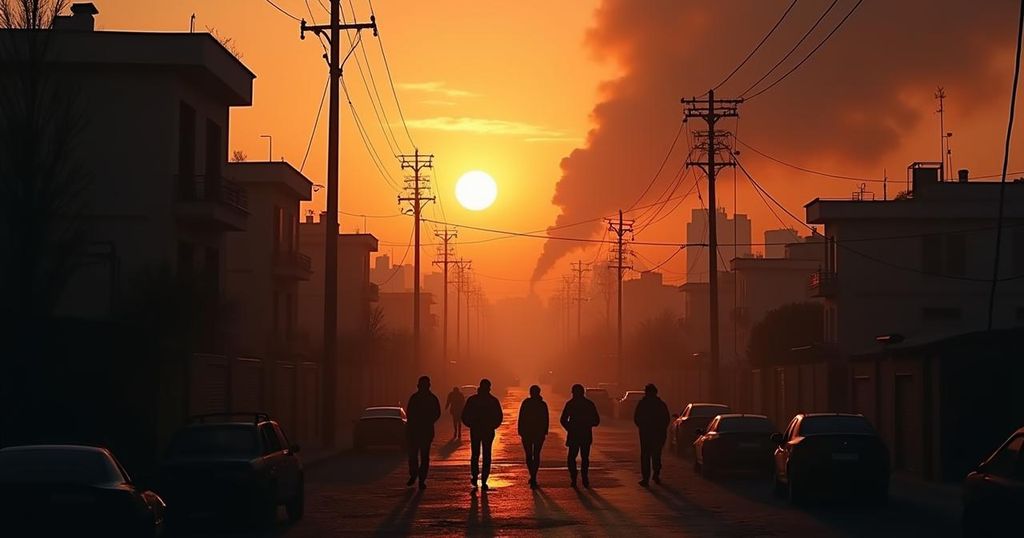Israel Intensifies Military Campaign in Lebanon Amid Escalating Conflict
The Israeli military has escalated its offensive in Lebanon, launching airstrikes on Beirut’s southern suburbs and undertaking operations in the West Bank targeting Hamas leaders. The conflict, which has resulted in significant casualties, is part of a larger war initiated by Hamas’s attack on Israel in October 2023 and reflects ongoing tensions with Hezbollah. The humanitarian crisis in Gaza is worsening amid military actions and limited international intervention, while U.S. support for Israel persists despite political tensions.
The recent escalation of hostilities in Lebanon has seen the Israel Defense Forces (IDF) intensify their military operations, resulting in extensive airstrikes across Beirut’s southern suburbs. On Thursday, these strikes targeted both soldiers and medics, signaling a significant uptick in the Israeli offensive. Furthermore, an airstrike in the West Bank aimed at a high-ranking Hamas official in Tulkarm reportedly resulted in the deaths of at least 18 individuals, as confirmed by Palestinian authorities. This latest round of conflict is a continuation of the ongoing Israel-Gaza war that commenced when Hamas militants executed a large-scale cross-border assault on October 7, 2023, which resulted in approximately 1,200 fatalities and the abduction of numerous civilians. In response, Israel declared a state of war against Hamas, prompting a ground invasion that led to unprecedented levels of displacement within the region. The conflict with Hezbollah, a militant group supported by Iran, has exacerbated tensions further, resulting in Israel’s military engagement and air operations in southern Lebanon. These operations have reportedly resulted in the deaths of over 1,400 individuals, including key figures such as Hasan Nasrallah, the leader of Hezbollah. The violence along the Israel-Lebanon border is embroiled in a long-standing history of conflict that traces back to the establishment of Israel in 1948. In parallel, Israel’s actions in the Gaza Strip represent one of the most catastrophic military campaigns of recent decades, claiming tens of thousands of lives and leaving substantial portions of the population in dire humanitarian straits. The Israeli government has faced ongoing pressure from international allies, particularly from Western nations, to permit greater humanitarian assistance to flow into Gaza, yet has resisted these calls amid worsening conditions. Despite differing opinions within the U.S. political landscape concerning Israeli military actions, the United States continues to provide substantial support, including military aid and diplomatic backing, often countering efforts at the United Nations to facilitate cease-fires or humanitarian efforts. The intricate history of the Israeli-Palestinian conflict continues to fuel the volatile situation in the region, complicating prospects for peace and stability.
The ongoing conflict in the Middle East, particularly the Israeli-Palestinian and Israel-Lebanon conflicts, is rooted in deep historical grievances and territorial disputes. The recent escalations reflect both the renewed hostilities initiated by Hamas against Israel and Israel’s robust military response. The situation is further complicated by the involvement of regional actors such as Hezbollah, Iran’s support for militant groups, and the ongoing humanitarian crisis in Gaza. The United States’ stance on the issue remains pivotal yet contentious as it navigates its relationships with both Israel and Arab nations. Understanding this context is crucial to grasp the significance of the recent military operations and their implications for regional stability.
In summary, the intensified military operations by the IDF in Lebanon and the West Bank exemplify the deteriorating security situation in the region as a direct consequence of the long-standing conflicts involving Israel, Hamas, and Hezbollah. The mounting toll of civilian casualties and the humanitarian crisis in Gaza underscore the critical need for a reassessment of diplomatic efforts to address the roots of this enduring conflict. As the situation continues to evolve, the prospect for peace remains uncertain against the backdrop of historical grievances and geopolitical complexities.
Original Source: www.washingtonpost.com




Post Comment